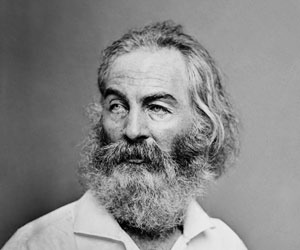
Song of Myself (opening) Walt Whitman
На этой странице вы найдете полный текст песни "Song of Myself (opening)" от Walt Whitman. Lyrxo предлагает вам самый полный и точный текст этой композиции без лишних отвлекающих факторов. Узнайте все куплеты и припев, чтобы лучше понять любимую песню и насладиться ею в полной мере. Идеально для фанатов и всех, кто ценит качественную музыку.

“I celebrate myself, and sing myself,
And what I assume you shall assume,
For every atom belonging to me as good belongs to you.
I loafe and invite my soul,
I lean and loafe at my ease observing a spear of summer grass.
My tongue, every atom of my blood, form’d from this soil, this air,
Born here of parents born here from parents the same, and their parents
the same,
I, now thirty-seven years old in perfect health begin,
Hoping to cease not till death.
Creeds and schools in abeyance,
Retiring back a while sufficed at what they are, but never forgotten,
I harbor for good or bad, I permit to speak at every hazard,
Nature without check with original energy.”
In lines one to fourteen of Walt Whitman’s “Song of Myself”, Whitman declares who he is. He says that he celebrates and sings of himself as if he is proud of who he is as a person. He states that others assume what he assumes for every atom belonging to himself belongs to others as if he was declaring that others should be proud to sing and celebrate themselves, for humans are all the same; same “atoms”, general structures of the human body, same organs, etc.
He goes on to relate how every human is the same: all born from a set of parents, and they born from another set of parents as well, but as he grows older claiming to be in perfect health at age thirty-seven, he hopes to spend his life doing something meaningful until he dies of natural causes.
As schools and churches (creeds) are in dormancy (abeyance), he chooses to speak at his own risk as a disobedience to the church and school ideals. He “harbors” for good and the bad and advocates for both ideals as if he hosts them in his own home.
In the opening of Whitman’s “Song of Myself”, Walt declares who he is; a normal human being, born from a set of parents like everyone else, assuming similar ideas as everyone else assumes. He says what he wants to, good or bad, at his own risk as any other person has the freedom to do without being restricted by the church or schools.
And what I assume you shall assume,
For every atom belonging to me as good belongs to you.
I loafe and invite my soul,
I lean and loafe at my ease observing a spear of summer grass.
My tongue, every atom of my blood, form’d from this soil, this air,
Born here of parents born here from parents the same, and their parents
the same,
I, now thirty-seven years old in perfect health begin,
Hoping to cease not till death.
Creeds and schools in abeyance,
Retiring back a while sufficed at what they are, but never forgotten,
I harbor for good or bad, I permit to speak at every hazard,
Nature without check with original energy.”
In lines one to fourteen of Walt Whitman’s “Song of Myself”, Whitman declares who he is. He says that he celebrates and sings of himself as if he is proud of who he is as a person. He states that others assume what he assumes for every atom belonging to himself belongs to others as if he was declaring that others should be proud to sing and celebrate themselves, for humans are all the same; same “atoms”, general structures of the human body, same organs, etc.
He goes on to relate how every human is the same: all born from a set of parents, and they born from another set of parents as well, but as he grows older claiming to be in perfect health at age thirty-seven, he hopes to spend his life doing something meaningful until he dies of natural causes.
As schools and churches (creeds) are in dormancy (abeyance), he chooses to speak at his own risk as a disobedience to the church and school ideals. He “harbors” for good and the bad and advocates for both ideals as if he hosts them in his own home.
In the opening of Whitman’s “Song of Myself”, Walt declares who he is; a normal human being, born from a set of parents like everyone else, assuming similar ideas as everyone else assumes. He says what he wants to, good or bad, at his own risk as any other person has the freedom to do without being restricted by the church or schools.
Комментарии (0)
Минимальная длина комментария — 50 символов.












